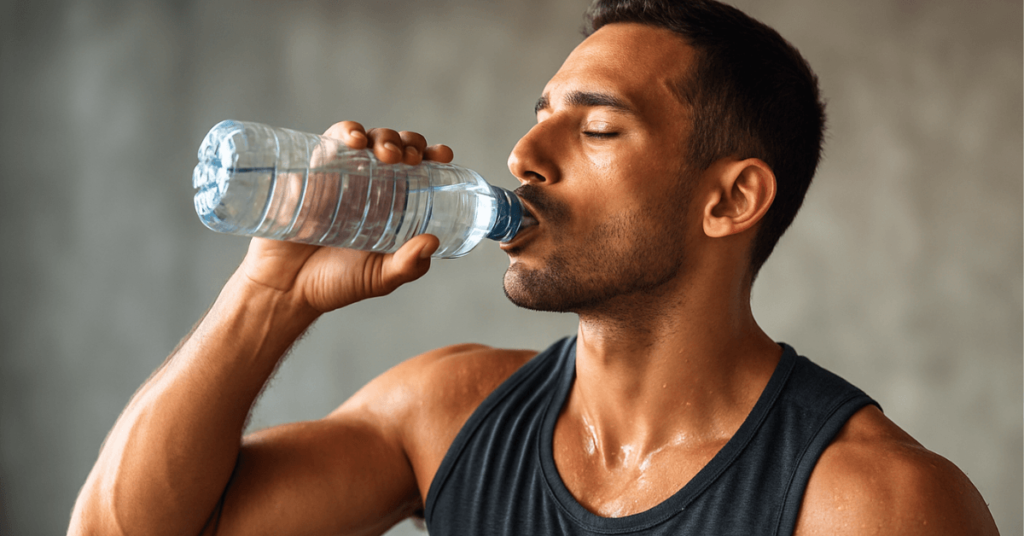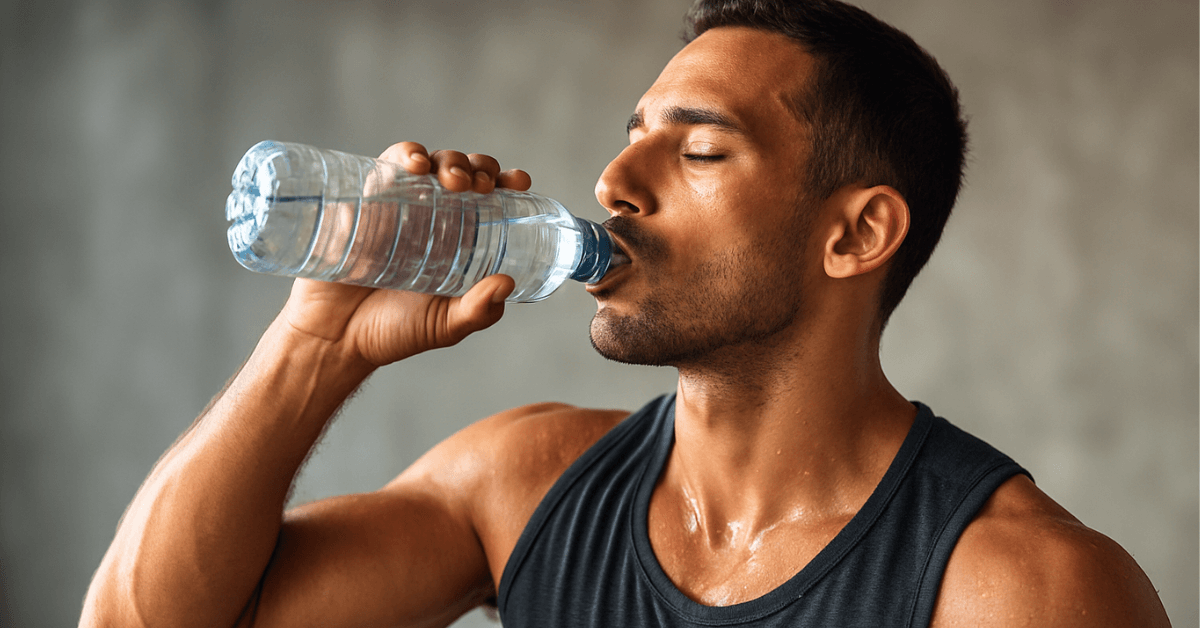Hydration and Muscle Performance Discover how hydration affects muscle performance, boosts strength, speeds recovery, and prevents injury. Learn the science, signs of dehydration, and hydration tips for peak workout results.
Hydration isn’t just about quenching thirst—it’s about powering your muscles at their peak. Your muscles are nearly 75% water, and just a small drop in hydration can reduce strength, slow recovery, and increase the risk of injury. The right water intake can be the difference between an average workout and a record-breaking performance.
In this post, we’ll dive deep into how hydration affects muscle performance, why it’s critical for athletes and fitness enthusiasts, and how you can master your water game for maximum gains.

1. The Science Behind Muscles and Water
Your muscles aren’t just bundles of protein and fibers—they’re complex tissues filled with fluids, electrolytes, and nutrients. Here’s why water is so essential:
- Nutrient Delivery: Water helps transport oxygen, glucose, and amino acids to muscle cells. Without enough water, this nutrient supply chain slows down.
- Waste Removal: Hydration assists in flushing out metabolic waste like lactic acid, which builds up during intense exercise and causes soreness.
- Cell Volume and Muscle Growth: Research shows that hydrated muscle cells increase protein synthesis—a key factor in muscle growth.
Think of water as the “fuel pipeline” for your muscles. If the pipeline is clogged (dehydration), performance suffers.
2. How Dehydration Sabotages Muscle Performance
Even mild dehydration—losing just 1-2% of your body’s water weight—can have noticeable effects on muscle performance:
a. Reduced Strength and Endurance
When your muscles lack water, their ability to contract efficiently decreases. This means lower lifting capacity, less stamina, and quicker fatigue.
b. Slower Recovery
Hydration speeds up the removal of toxins and the delivery of nutrients post-workout. Dehydration slows these processes, leading to lingering soreness.
c. Increased Risk of Injury
Dry muscles are less elastic. Without proper hydration, your risk of strains, pulls, and cramps skyrockets.
d. Mental Fatigue
Muscle performance isn’t just physical—it’s also mental. Dehydration affects brain function, leading to poor focus, slower reaction times, and reduced motivation.
3. Hydration and Muscle Energy Production
Your muscles store carbohydrates as glycogen, and each gram of glycogen is stored with about 3 grams of water. When you’re dehydrated, your glycogen reserves drop faster, meaning your muscles run out of fuel quicker.
During workouts, especially high-intensity sessions, dehydration forces your body to burn through its energy reserves inefficiently, leaving you drained far before the finish line.
4. Electrolytes: The Muscle’s Best Friend
Hydration isn’t just about plain water—electrolytes play a critical role in muscle function. These minerals (sodium, potassium, magnesium, calcium) help:
- Maintain muscle contraction and relaxation
- Prevent cramps and spasms
- Balance fluid levels inside and outside muscle cells
When you sweat, you lose electrolytes. If you only replace the lost water without replenishing electrolytes, you can dilute your blood sodium levels, leading to hyponatremia—a dangerous condition that can cause muscle weakness, confusion, and even collapse.
5. Signs You’re Not Hydrated Enough for Peak Muscle Performance
Before you feel thirsty, your muscles may already be underperforming. Watch out for these warning signs:
- Frequent muscle cramps during workouts
- Dry mouth and lips
- Dark yellow urine (ideal urine should be pale yellow)
- Unusual fatigue or dizziness during exercise
- Slower recovery times
- Loss of coordination or focus
6. How Much Water Do Your Muscles Really Need?
Water needs vary based on weight, activity level, climate, and workout intensity. A general guideline for active individuals:
- Daily Baseline: 30–35 ml of water per kilogram of body weight
- Pre-Workout: 500–600 ml of water 2–3 hours before exercise
- During Workout: 150–250 ml every 15–20 minutes (more if you’re sweating heavily)
- Post-Workout: 500–700 ml for every pound of body weight lost during exercise (weigh yourself before and after workouts to measure this)
Pro Tip: Use a water bottle with volume markings to track your intake effortlessly.
7. The Best Ways to Stay Hydrated for Muscle Performance
a. Start Hydrating Early
Don’t wait until you feel thirsty—start your day with a glass of water and keep sipping throughout the day.
b. Include Electrolyte Sources
If your workouts last longer than an hour, consider sports drinks, coconut water, or electrolyte powders.
c. Eat Water-Rich Foods
Foods like cucumbers, watermelon, oranges, and spinach can contribute to your daily water intake.
d. Avoid Dehydration Triggers
Limit excessive caffeine and alcohol, which increase water loss.
e. Use the “Clear Pee Test”
Check your urine color—it’s the simplest hydration indicator.
8. Hydration for Different Types of Training
Strength Training
Hydration supports explosive muscle contractions and joint lubrication. Dehydration can significantly lower lifting power.
Endurance Training
Long runs or cycling sessions demand constant fluid replacement to avoid muscle fatigue and overheating.
High-Intensity Interval Training (HIIT)
HIIT workouts cause rapid sweating and electrolyte loss—rehydration with added minerals is key.
Recovery Days
Even on rest days, proper hydration helps muscles repair and adapt from previous workouts.
9. Myths About Hydration and Muscle Performance
Myth 1: “If I’m not thirsty, I don’t need water.”
By the time you feel thirsty, your muscles are already dehydrated.
Myth 2: “Drinking too much water before a workout makes me stronger.”
Overhydrating right before a session can cause discomfort and reduce performance—hydrate steadily instead.
Myth 3: “Only athletes need to worry about hydration.”
Whether you’re lifting weights, doing yoga, or walking daily, your muscles need consistent hydration for peak function.
10. Final Thoughts: Hydration as Your Muscle’s Secret Weapon
Hydration might seem basic compared to protein powders or advanced training techniques, but it’s foundational for muscle performance. Without enough water and electrolytes, your muscles can’t contract efficiently, recover properly, or grow to their full potential.
By making hydration a non-negotiable part of your fitness routine—starting your day with water, sipping regularly, and replenishing electrolytes—you’ll notice:
- Improved endurance
- Faster recovery
- Fewer cramps and injuries
- Enhanced strength and focus
Remember, the next time your workout feels harder than usual, don’t just check your weights or form—check your water bottle.

